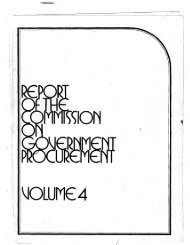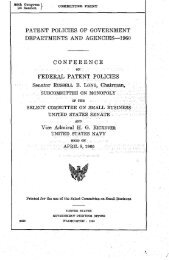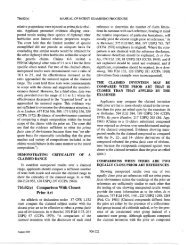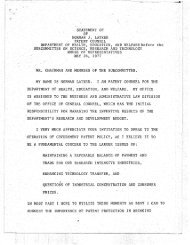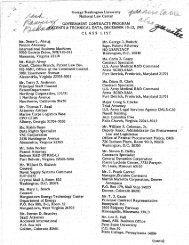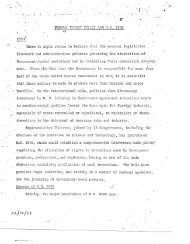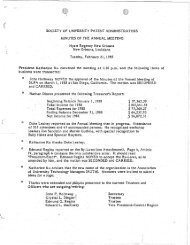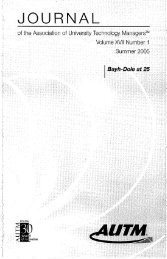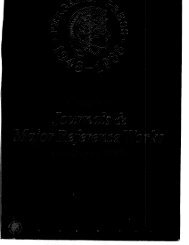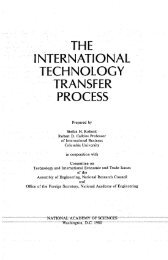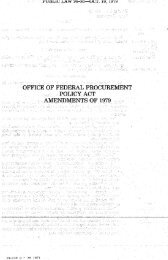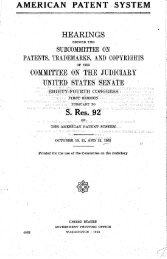.~·484 - Bayhdolecentral
.~·484 - Bayhdolecentral
.~·484 - Bayhdolecentral
You also want an ePaper? Increase the reach of your titles
YUMPU automatically turns print PDFs into web optimized ePapers that Google loves.
'"'':''<br />
- 4 -<br />
In sum, in the context of the Space Station, a wide range of<br />
possible cooperative research activities might occur involving<br />
federal employees and employees of other organizations. For<br />
example, cooperative agreements might cover research aboard the<br />
Space Station between federal employees and employees of a U.S.<br />
corporation, university or other domestic organization, or research<br />
conducted only by employees of a domestic organization, where the<br />
facilities and/or equipment were provided by the U.S. government.<br />
By entering into a cooperative agreement under the, Act, the U.S.<br />
government could assure that any resulting technology would be<br />
licensed or owned by a U.S. corporation. The U. S. government<br />
could agree to grant a royalty-bearing license, or ownership, for<br />
any inventions made by a federal employee under section 11(b) (2)<br />
or (3). This, would permit the U. S. organization to take commercial<br />
advantage of any patents resulting from inventions made in the<br />
course of the research aboard the Space Station. In this way, the<br />
benefits of the research would go to the U.S. economy. At the<br />
same time, 'the Space Station would be the recipient of royalties<br />
earned by the licenses pursuant to section 13 of the Act.<br />
The Act provides special rules for those circumstances in which a<br />
federal laboratory might agree to a cooperative research and and<br />
development venture with a foreign firm or firms, where employees<br />
of those firms would conduct joint research'with federal employees<br />
aboard the Space Station. The Act, in section 11(c) (4) (B),<br />
permits cooperative agreements with foreign firms, but requires<br />
that the laboratories "give preference to business units located<br />
in the United States which agree that products embodying inventions<br />
made under the cooperative research and development agreement...<br />
will be manufactured in the United States". Further, the Act<br />
requires that the laboratory director, before entering into an<br />
agreement "in the case of any industrial organization or other<br />
person subject to the control of a foreign company or government,<br />
as appropriate, take into consideration whether or not such<br />
foreign government permits United States agencies, organizations,<br />
or other persons to enter into cooperative research and development<br />
agreements and licensing agreements". Should the Space Station<br />
decide to enter into cooperative research agreements with a<br />
foreign corporation it should assure that any patent rights<br />
clause in the agreement provide maximum rights of commercialization<br />
to U.S. firms.<br />
Technical Data<br />
For your information the latest draft of the proposed Executive<br />
Order on technology transfer requires agencies to delegate to its<br />
Federal laboratories the right to negotiate in cooperative<br />
agreements the disposition of intellectual property. As<br />
intellectual property includes technical data, the Space Station<br />
as a Federal laboratory could enter into a cooperative agreement<br />
leaving ownership or an exclusive license to technical data with<br />
anon-Federal entity.<br />
r-



